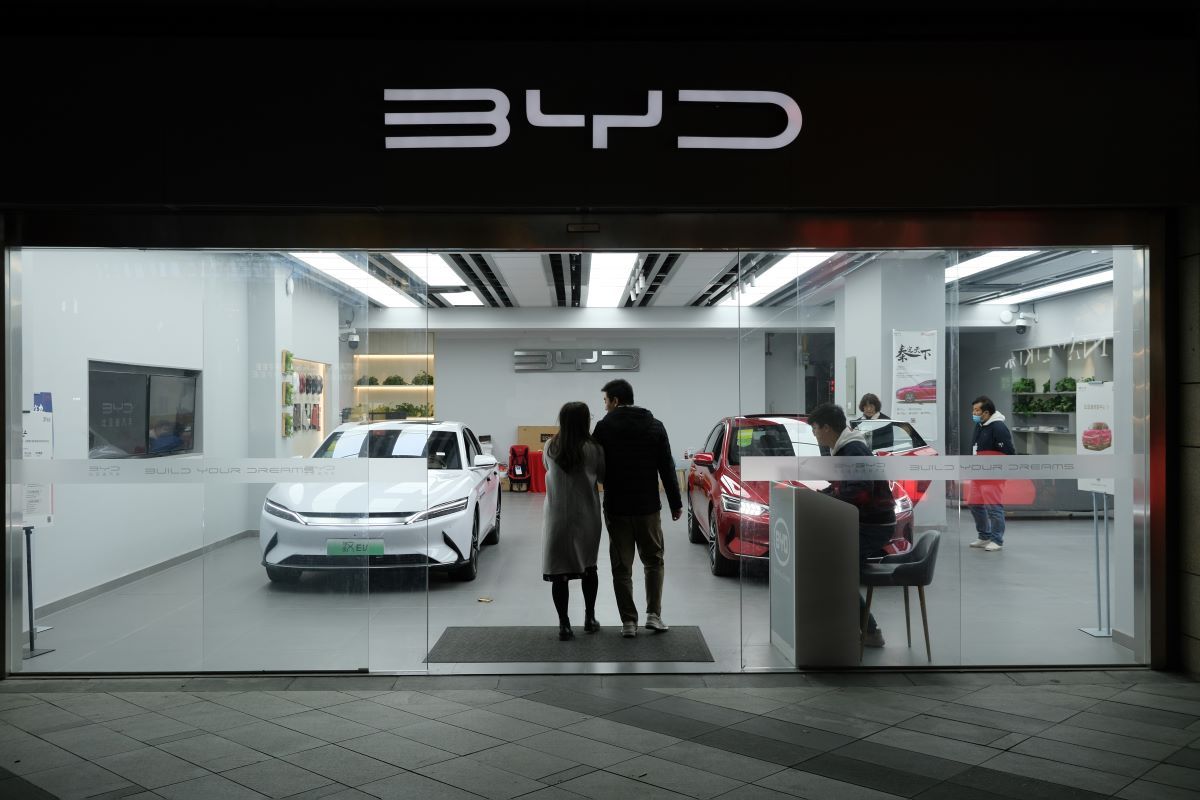China’s BYD has emerged as the world’s largest seller of electric vehicles (EVs) in the period between October to December 2023 (Q4), surpassing industry giant Tesla in quarterly sales for the first time.
During Q4 2023, BYD reported a sales figure of 526,409 electric vehicles, outpacing Tesla, which recorded EV sales of 480,000 units. While Tesla’s sales showed a notable 20% year-on-year increase in Q4, it marked a decline from the 27% surge in the preceding quarter.
The Chinese rival, on the other hand, demonstrated robust growth by selling 3.02 million vehicles of various types throughout the entire year, signifying a 62% increase from the previous year. BYD’s EV sales, which experienced a 73% surge, reached 1.57 million units during the same period.
Despite this, Tesla retained its lead for the entire year, achieving its annual delivery target with 1.81 million EVs sold. Notably, Tesla’s CEO Elon Musk had previously expressed the company’s potential to manufacture 2 million cars in 2023. However, industry experts attribute the shortfall to a series of price reductions that failed to stimulate sufficient demand to support such ambitious production levels.
The dynamic competition between BYD and Tesla now sets the stage for a compelling narrative in the evolving landscape of the global electric vehicle market. Industry observers anticipate further developments in this dynamic and competitive sector.
According to S&P Global Mobility’s 2024 global sales forecast, 2023 posted an estimated 9.6 million battery electric passenger vehicles (BEVs), accounting for an estimated 12% of global passenger vehicle sales. For 2024, the number is expected to reach 13.3 million units worldwide – a 16.2% market share.
China is forecasted to hold a market share of 28.6%, compared to Europe with 22.2% and the US with 13.2%.
China’s BYD surpasses Tesla after US company draws regulatory scrutiny
BYD outperforming Tesla in quarterly sales for EVs comes amid increased regulatory scrutiny for the Austin-based electric car manufacturer. Tesla encountered regulatory examination concerning its self-driving technology, resulting in a recall of more than 2 million vehicles last month. The company received criticism from US officials for insufficient measures in its autopilot system to ensure driver attentiveness, marking its fourth recall in less than two years.
Looking ahead, despite uncertainties in the broader EV market, Tesla is projected to achieve over 2.1 million vehicle deliveries in 2024, as per a research note by Baird Analyst Ben Kallo.
Also, Tesla generates more revenue and profit than BYD due to its higher-priced vehicles. Besides, China’s BYD does not sell its cars in the US, avoiding a hefty import tariff and other taxes that it could face in the country. However, BYD cars are sold in Europe, where it aims to sell around 800,000 cars by 2030.
Achieving this objective could be difficult, considering the European Commission initiated an anti-subsidy investigation into Chinese electric vehicle imports in September 2023. Ursula von der Leyen, the President of the European Commission, had said that Chinese electric vehicles were inundating global markets and were experiencing an artificial price reduction due to state subsidies.
This move, criticised by China as a protectionist act, could lead to punitive tariffs, disrupting the automotive industry and impacting China-EU economic relations.
However, the outlook for China’s automobile industry looks positive. For 2024, The China Association of Automobile Manufacturers predicts a 3% growth in new cars, including exports, reaching a total of 31 million units. All in all, China’s electric vehicle market size is estimated at $305.57 bn in 2024, and poised to reach $674.27 bn by 2029, as per Mordor Intelligence.
“Currently, the passenger (EV) cars segment is witnessing more demand than commercial vehicles, and it is expected to continue its dominance,” says the researcher.


 Australia
Australia China
China India
India Indonesia
Indonesia Japan
Japan Malaysia
Malaysia Philippines
Philippines Singapore
Singapore South Korea
South Korea Taiwan
Taiwan Thailand
Thailand Vietnam
Vietnam







